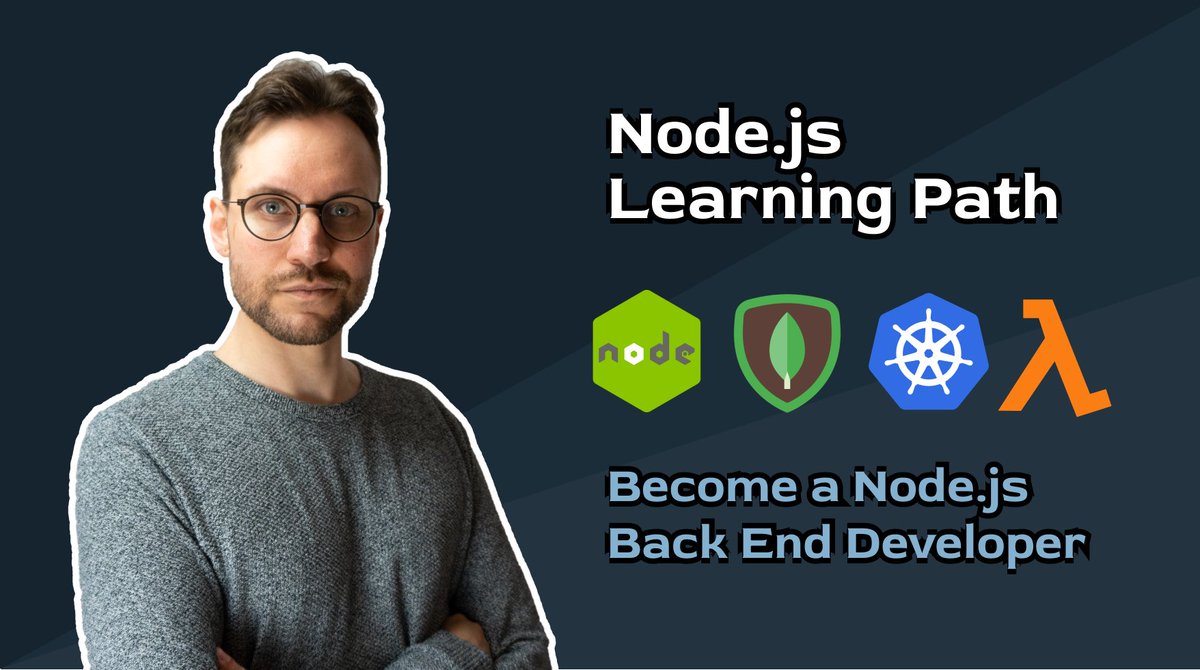Node.js Learning Path 
Master these topics, and you'll be ready to take on your first job as a Node.js Back End Developer!
Let's go through them


Master these topics, and you'll be ready to take on your first job as a Node.js Back End Developer!
Let's go through them


 JavaScript and Node.js fundamentals
JavaScript and Node.js fundamentalsThis probably doesn't come as a surprise, but this is the first place to start.
Become familiar with:
- JavaScript ES6+ syntax
- Node.js 10+ fundamentals
 JavaScript ES6+ syntax
JavaScript ES6+ syntaxYou should be comfortable with:
- Arrow functions
- Promises (async/await)
- Modules
 Node.js 10+ fundamentals
Node.js 10+ fundamentalsYou should understand:
- The non-blocking I/O model
- Node event loop
- Asynchronous programming
 Testing Frameworks
Testing FrameworksYou should be able to test your Node.js application.
I suggest you look into these:
- Jest (test runner)
- Chai (assertion library)
- Sinon (stubs & mocks)
 Node.js Frameworks
Node.js FrameworksWhen you're comfortable with Node.js, you move on to pick up a Node.js Web Application Framework.
These are the two that you should focus on:
- Express.js
- Koa.js
 Express.js
Express.jsExpress.js is a minimalistic Node.js framework for writing Web Applications, and it's by far the most popular and most widely used.
 Koa.js
Koa.jsKoa.js is the next generation of Express.js.
It's developed by the same team and is widely used as well.
 MongoDB & Mongoose
MongoDB & MongooseMongoDB is a document-oriented database system.
It is widely used with Node.js Application and is a part of the popular MEAN and MERN stack.
Mongoose is a library that makes the interaction between MongoDB and Node.js more smooth.
Alright! Let's just do a small stop here.
When you can master the above topics, you're already fit to take up your first job as a Node.js Back End Developer.
You can start applying now
Meanwhile, advance your skills further in the below topics
When you can master the above topics, you're already fit to take up your first job as a Node.js Back End Developer.
You can start applying now

Meanwhile, advance your skills further in the below topics

 AWS Lambda
AWS LambdaBecome familiar with the concept of Serverless Applications, and start practicing using Node.js to write Lambda Functions for AWS.
This is highly useful both as a Back End Developer and a DevOps Engineer.
 Node.js Microservices
Node.js MicroservicesBecome familiar with the concept of Microservices, and become familiar with Docker and docker-compose.
Practice your HTTP skills by creating small, individual Express.js apps that communicate with each other.
 Kubernetes
KubernetesKubernetes is a Container Orchestrator.
As an addition to the above, practice how to manage your Node.js Microservices using Kubernetes.
 TypeScript
TypeScriptThis is optional.
However, adding TypeScript will radically increase the quality and maintainability of your code.
Also, given the drastic rise in popularity, it'll certainly look nice on your CV!
Let's sum it up:
 JavaScript and Node.js fundamentals
JavaScript and Node.js fundamentals
 Testing Frameworks
Testing Frameworks
 Node.js Frameworks
Node.js Frameworks
 MongoDB & Mongoose
MongoDB & Mongoose
 AWS Lambda
AWS Lambda
 Node.js Microservices
Node.js Microservices
 Kubernetes
Kubernetes
 TypeScript
TypeScript
 JavaScript and Node.js fundamentals
JavaScript and Node.js fundamentals Testing Frameworks
Testing Frameworks Node.js Frameworks
Node.js Frameworks MongoDB & Mongoose
MongoDB & Mongoose AWS Lambda
AWS Lambda Node.js Microservices
Node.js Microservices Kubernetes
Kubernetes TypeScript
TypeScript
Of course, in the world of Software Development, you'll never run out of new things to learn.
But this is a GREAT start.
When you master these topics, you are guaranteed a lot of interest in the job market
But this is a GREAT start.
When you master these topics, you are guaranteed a lot of interest in the job market

Make sure to add these skills to your LinkedIn profile, and let all the recruiters know that you are a valuable and skilled Node.js Back End Developer.
Don't hold yourself back.
I hope you enjoyed reading
Don't hold yourself back.
I hope you enjoyed reading


 Read on Twitter
Read on Twitter


